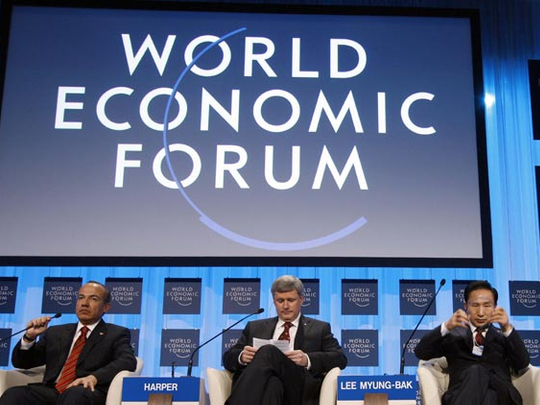
The search for renewed moral values for global capitalism was the dominant theme of this year's World Economic Forum. It was striking that this came from both the politicians, who have to answer to their furious voters who have seen the banking industry make such a mess of things, and the regulators who are well aware that they failed in their responsibilities, and also from the bankers themselves.
As French President Nicolas Sarkozy said in his opening address: "We can only save capitalism by rebuilding it, by restoring its moral dimension. What do we need, if not rules and governance that reflect shared values, a common morality? We cannot govern globalisation while relegating half of humanity to the sidelines, ignoring India, Africa or Latin America."
While it is easy to call for this kind of social responsibility, it is much harder to put into practice.
This meeting at Davos has allowed the planners to show the politicians and bankers that the recession has forced fundamental change on the way banks have to think about their business, and that they are getting ready for practical moves to enforce their social and economic values.
Missing the boat
But this is not happening in the rest of the corporate world. Industry in general is very far from thinking about how to run their business in a more socially aware manner. As Indra Nooyi, Chairman of PepsiCo, put it: "Those of us in industry had the chance in 2009 to get together and define how we can quantify and enforce our social role, ahead the governments telling us what to do. We missed that chance, so we now are in danger of lagging behind public opinion and government regulation".
This debate is how to move accounting the success of a company away from a simple measurement of earning per share, and to include other more social goals into the way that a company measures its achievements.
"We are not talking about some voluntary programme for corporate social responsibility, or lip service to the Millenium Development Goals. We are talking about how the corporate world re-finds its social responsibilities at the core of its operations," said one speaker.
Financial regulators
The banking regulators have already started to move into this area in detail. For example they have detailed plans for new regulations that will encourage socially useful, as well as economically useful banking activity, and will discourage economically un-useful activity.
For example, one plan currently going through the Basel committees is to impose different capital reserve requirements on different activities, making the less useful activities more expensive. Other plans are under discussion in Washington, London and Paris on how to ban banks from activities, and control others.
These financial regulators know that they need to act soon. The politicians need to show that things are happening, and as a result new rules are in hand to come out this year that aim to produce more capital, more counter cyclical capital, tackle the issue of having financial institutions which are too big to fail, and encourage more economically useful activity while discouraging speculation.
Bretton Woods II?
As the leaders of the world look ahead to surviving the recession, they are desperate to find themselves up to the challenge of re-defining how the global economy works. One rather misleading short-hand for this search is to refer back to the Bretton Woods agreement, which managed the post-war global economy for decades till it ran out of steam.
The situation today is very different, with the global economy expanded well beyond North America and Europe of the 1950s, to include the major economies of India and China, and others like Brazil or South Africa which are significant forces in the world.
Economic and social benefits have spread far and wide from years of free trade, fast developing technologies, and better education and training. In addition, the vital extra impact has been the internet offering everyone everywhere quality access to communication and information.
The issue at hand is how to make sure that the whole of humanity is able to share in the global economy, confident that they are equal partners, and able to share in the benefits.
No one should feel that capitalism is out to get them. No one should feel that they are the victims of rapacious globalisation.
The discussions in Davos, and in many other forums around the world, are trying to lay down the parameters for the discussions on what rules and laws will be required to make this happen, and maybe build a new capitalism which will run for the next few decades.
No one ever accused Davos of modesty, and it is a very ambitious goal, but if it works, it will be worth it.












